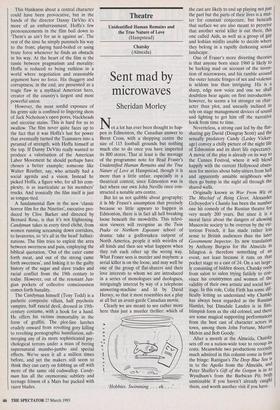Theatre
Unidentified Human Remains and the True Nature of Love (Hampstead) Chatsky (Almeida)
Sent mad by microwaves
Sheridan Morley
Not a lot has ever been thought to hap- pen in Edmonton, the Canadian answer to Brent Cross, with a shopping centre the size of 115 football grounds but nothing much else to do once you have inspected its 800 stores. That at least is the message of the programme note for Brad Fraser's Unidentified Human Remains and the True Nature of Love at Hampstead, though it is more than a little unfair, especially in a theatrical context, since Edmonton was in fact where our own John Neville once con- structed a notable arts centre.
But let us not quibble about geography; it is Mr Fraser's assumption that precisely because so little appears to happen in Edmonton, there is in fact all hell breaking loose beneath the snowdrifts. This televi- sion viewers will recognise as the Twin Peaks or Northern Exposure school of drama: take a godforsaken outpost of North America, people it with weirdos of all kinds and then see what happens when they rub each other up the wrong way. What Fraser sees is murder and mayhem: a serial killer is on the loose, and may well be one of the group of flat-sharers and their love interests to whom we are introduced in a series of monologues and duologues, intriguingly intercut by way of a telephone answering-machine and lit by David Hersey, so that it most resembles not a play at all but an avant-garde Canadian movie.
Clearly we are meant to see rather more here than just a murder thriller: which of 'Hobbies. Swimming. . . eh. the cast are likely to end up playing not just the part but the parts of their lives is a mat- ter for constant conjecture, but beneath that surface we are also meant to perceive that another serial killer is out there, this one called Aids, as well as a group of gay and lesbian misfits unable to decide where they belong in a rapidly darkening sexual landscape. One of Fraser's more diverting theories is that anyone born since 1960 is likely to be barking mad on account of the inven- tion of microwaves, and his ramble around the outer lunatic fringes of sex and violence is seldom less than intriguing. His is a sharp, edgy new voice and one we shall doubtless hear again; on first introduction, however, he seems a lot stronger on char- acter than plot, and uneasily inclined to rely on stage management devices of sound and lighting to get him off the narrative hook from time to time.
Neverteless, a strong cast led by the flat sharing gay David (Dougray Scott) and the sexually predatory Candy (Lesley Vicker- age) convey a chilly picture of the night life of Edmonton and its short life expectancy. A movie of the play is already on its way to the Cannes Festival, where it will blend happily with the current Hollywood obses- sion for movies about baby-sitters from hell and apparently amiable neighbours who then go bump in the night all through the shared walls.
Originally known as Woe From Wit or The Mischief of Being Clever, Alexander Griboyedov's Chatsky has been the number one hit comedy of the Russian theatre for very nearly 200 years. But since it is a moral farce about the dangers of allowing Muscovite society to be overrun by the vic- torious French, it has made rather less sense to British audiences than the later Government Inspector. Its new translation by Anthony Burgess for the Almeida in Islington is therefore something of an event, not least because it runs on that pocket stage to a cast of 24. On a set large- ly consisting of hidden doors, Chatsky reels from salon to salon trying futilely to con- vince his countrymen and women of the validity of their own artistic and social her- itage. In this role, Colin Firth has some dif- ficulty letting us understand why ChatskY has always been regarded as the Russian Hamlet, but Dinsdale Landen is in fine, blimpish form as the old colonel, and there are some magical supporting performances from the best cast of character actors in town, among them John Fortune, Murray Melvin and Bob Goody. After a month at the Almeida, ChatskY sets off on a nation-wide tour to recoup its costs. Meanwhile two productions recently much admired in this column come in from the fringe: Rattigan's The Deep Blue Sea la in to the Apollo from the Almeida, and Peter Shaffer's Gift of the Gorgon is in to Wyndham's from the Barbican Pit; bog,' unmissable if you haven't already caught them, and worth another visit if you have.


























































 Previous page
Previous page